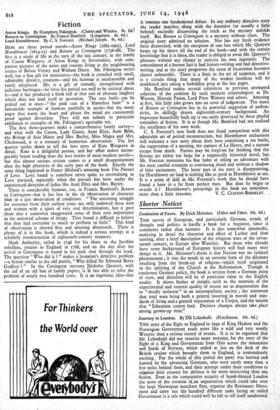Shorter Notices
Confusion of Faces. By Erich Meissner. (Faber and Faber. 10s. 6d.) Tins survey of European, and particularly German, trends of thought and politics is hardly a book for a beginner, since it comments rather than narrates. It is also somewhat spasmodic, analysing in detail the character and effect of Luther and then turning, after a brief description of the religious wars of the seven- teenth century, to Europe after Waterloo. But those who already have some background of European history will find many wise things in it. Mr. Meissner's thesis is that Nazism was no isolated phenomenon ; it was the result in an extreme form of the dilemma resulting from the break-up of religion—which itself originated in the splitting of the Church at the Reformation. Though it condemns German policy, the book is written from a German point of view, and therefore will be of particular value to the. English reader. It shows flashes of insight, such as the mention of the experimental and esoteric quality of recent art as degeneration due to " deadly isolation " in an unsympathetic society ; the statement that total wars bring both a general lowering in morals and stan- dards of living and a general expectation of a Utopia, and the maxim that " Education cannot lead. Decisive changes always take place among grown-up men."






























 Previous page
Previous page